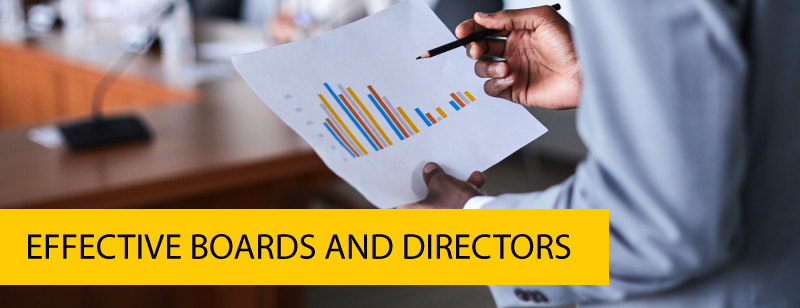
SESSIONS
DAY 1
Day 1, Session 1: How Covid is changing things for boards and management – new challenges and ‘the new normal’
- Pre-Covid developments now accelerating
- Understanding emerging risks and their mitigation
- Creativity, innovation and change
- Prevalence of fraud and abuse
- Reforming corporate culture
- The shape of the future corporation
- Taking account of changes in work-life balance and harmony
- The six ‘E’s’ – economy, efficiency, effectiveness, ethics, equity and environment
Including, short videos, exercises with discussion on creativity, culture, innovation, managing millennials and reputational management, webinar chat facility.
Day 1, Session 2: Board responsibilities for direction, resource provision and oversight of management
- How boards should formulate and communicate future policy and strategy
- Statements of purpose, vision, mission, and promise
- Areas where boards need to be active in policy formulation
- Balancing conflicting objectives and conflicts between objectives and available resources
- Distinguishing between the board’s responsibilities and those of management
- The responsibilities of the board’s chair
- The board’s conversation about reputational management
Provision for participant ongoing use of spreadsheets for individual or group ethical assessment, case studies on strategic failure and on how not to handle a reputational crisis, and exercises with discussion on reputational management, webinar chat facility.
Day 1, Session 3: ‘The professional board’ and filling the board’s assurance vacuum
- The developing roles of board chair, senior independent director, executive and independent directors
- Qualities the board needs to collectively possess
- Board committees, especially audit, risk, nominations and remuneration
- How can boards know that board policies are being implemented successfully?
- Effective reporting to the board by management
- The roles of internal audit, risk management, quality assurance and outside advisers
- Handling the risk of conflicting directions for management from the board
Short video, case studies on price-sensitive exaggerated public reporting of future prospects, on board’s responsibility for oversight of operations and on effective boards and board committees, discussion on audit committees oversight of external audit, webinar chat facility.
Day 1, Session 4: Embedding environmental, social and governance (ESG) and integrating ESG reporting and audit
- More than CSR (corporate social responsibility)?
- Davos Manifesto 2020: The Universal Purpose of a Company in the Fourth Industrial Revolution
- The importance for boards of the UN’s seventeen sustainability goals
- The International Integrated Reporting Council
- Why and how to embed ESG to avoid mere cosmetic adherence to ESG principles
- Integrating ESG with corporate objectives, performance and reporting
Short video, discussion on CSR/ESG issues, webinar chat facility.
DAY 2
Day 2, Session 1: Giving voice to stakeholders
- Whose company?
- Board accountability
- The new mix of stakeholders
- Stakeholder engagement
- Transparency
- The board’s strategic report
Short video, case studies on stakeholder relationships and on board transparency, webinar chat facility.
Day 2, Session 2: Leadership and decision-making in a crisis
- Politics and power in organisations
- Leadership is situational
- Formal and informal leadership
- The contemporary shift in leaderships styles
- Crisis leadership
- Leading on diversity
- Dealing with the contradictory challenges leaders face
- Leading family businesses and SMEs
A tool for participants to use on ‘Leader profiling – what makes a leader?’, exercises with discussion on leading by example, crisis leadership, and SMEs, webinar chat facility.
Day 2, Session 3: Differing board and business structures
- Unitary boards
- Two-tier boards
- Executive committees
- Which should it be – tall or flat organisations?
Exercise with discussion on tall and flat organisations and span of control, webinar chat facility.
Day 2, Session 4: Reviewing board performance
- Best practice principles for board evaluations
- Scope of board evaluations
- Approaches to evaluating boards
- Self assessments
- Independent board evaluations
- Reporting results and getting action
- Recurring weaknesses
Exercise with discussion on reviewing board performance, webinar chat facility.
The programme will develop to meet participants’ needs expressed during the webinar. So detailed elements described in this Outline may need to be omitted, depending upon time availability.
